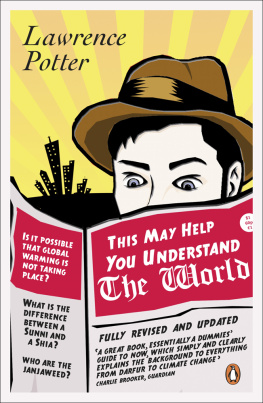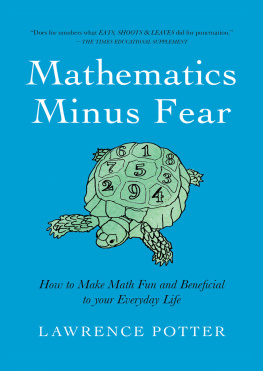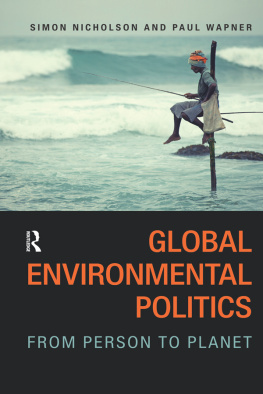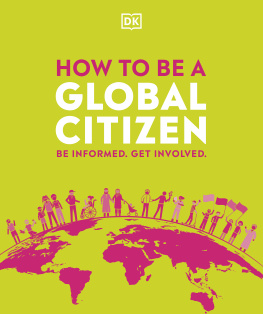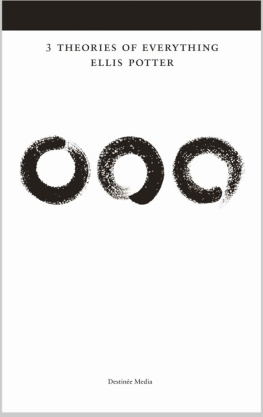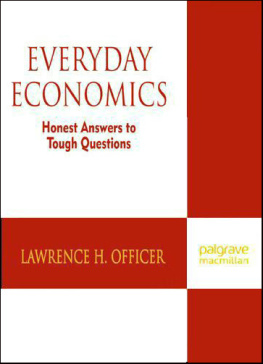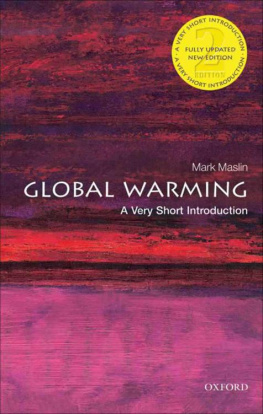This May Help You Understand the World
LAWRENCE POTTER
PENGUIN BOOKS
PENGUIN BOOKS
Penguin Books Ltd, 80 Strand, London WC2R 0RL , England
Penguin Group (USA) Inc., 375 Hudson Street, New York, New York 10014, USA
Penguin Group (Canada), 90 Eglinton Avenue East, Suite 700, Toronto, Ontario, Canada M4P 2Y3
(a division of Pearson Penguin Canada Inc.)
Penguin Ireland, 25 St Stephens Green, Dublin 2, Ireland (a division of Penguin Books Ltd)
Penguin Group (Australia), 250 Camberwell Road, Camberwell, Victoria 3124, Australia
(a division of Pearson Australia Group Pty Ltd)
Penguin Books India Pvt Ltd, 11 Community Centre, Panchsheel Park, New Delhi 110 017, India
Penguin Group (NZ), 67 Apollo Drive, Rosedale, Auckland 0632, New Zealand
(a division of Pearson New Zealand Ltd)
Penguin Books (South Africa) (Pty) Ltd, 24 Sturdee Avenue, Rosebank, Johannesburg 2196, South Africa
Penguin Books Ltd, Registered Offices: 80 Strand, London WC2R 0RL , England
www.penguin.com
First published in Great Britain in 2007 and in the United States of America in 2008 by Marion Boyars Publishers Ltd
This revised and updated edition published by Penguin Books 2011
Copyright Lawrence Potter, 2007, 2011
All rights reserved
Except in the United States of America, this book is sold subject to the condition that it shall not, by way of trade or otherwise, be lent, re-sold, hired out, or otherwise circulated without the publishers prior consent in any form of binding or cover other than that in which it is published and without a similar condition including this condition being imposed on the subsequent purchaser
ISBN: 978-1-84-614553-7
PENGUIN BOOKS
THIS MAY HELP YOU UNDERSTAND THE WORLD
Lawrence Potter went to school in Canterbury, and went to university in Oxford, and had little idea what to do next when these experiences came to their scheduled end.
He spent a year mulling it over, most notably failing in his bid to become the personal assistant to a politician by the name of Geoffrey Archer (as he thought) in his campaign to become the Mayor of London. It turned out that the politician was actually called Jeffrey Archer, which explained why Lawrence was unable to locate his website (www.jeffreyarcher.co.uk) in order to do even the most basic research on what Jeffreys views on London were.
Instead whilst his erstwhile boss languished in prison Lawrence trained to be a mathematics teacher. He quickly learnt that persuading adolescents to do sums is a challenge, something like herding a group of particularly uncooperative sheep without the help of a sheep dog, but he persevered, and he has had the pleasure of teaching in Streatham, Bromley,Rwanda and Croydon.
Later this year, he will be fortunate enough to marry the beautiful Nancy.
Lawrence Potter is also the author of Mathematics Minus Fear.
To Joan Potter
I am not stupid
I am not stupid. OK I admit that I was never going to make it into NASA, and I dont think that it is going to be me that first cracks nuclear fusion. But I can complete most Sudoku puzzles, I once almost won a pub quiz and my school results were decent. So why is it that I feel foolish when I read the newspapers, or watch the news, or find myself in one of these conversations about current events that people have when they have finished talking about the weather?
I know that I am not alone in feeling this way. Many of my friends some of whom have actually won pub quizzes and are holding down responsible jobs have also felt humiliated by their own lack of knowledge about world events.
An example. I have a good friend (call her Lola) who is currently writing her PhD on a particular aspect of monkey anatomy. There is no doubt that she has plenty of brain power. I met up with Lola for a drink after work one day, and found that she was unusually quiet. It turned out that she had just come back from a disastrous weekend with her boyfriends family.
Initially, all went smoothly. Everyone sat down to a hefty dinner, at which there was plenty of conversation, to which Lola contributed fully. She even made her boyfriends father laugh a couple of times a notoriously difficult feat to achieve, since most of the time he is only interested in telling his audience about his crucial role in the local Neighbourhood Watch. In case you are interested, he is responsible for preventing the local youth from committing criminal behaviour (such as picnics and ball games) on the well-manicured green at the centre of his village.
Eventually, after a tedious story about hooliganism involving deckchairs, talk turned towards the parents holiday plans. They were considering going somewhere exotic. Various locations were suggested the Bahamas, Peru, East Africa or Thailand. The father mentioned a permanent and inexplicable hankering for Sri Lanka. The problem was, he said, that he was a little worried by reports of the Tamil Tigers.
Now, Lola might specialise in monkeys, but she has a broad interest in all mammal species. She thought that she was familiar with pretty much all of them, and yet here was her boyfriends father talking about a tiger species of which she had no knowledge. So, quite reasonably, she asked if the Tamil Tiger was indigenous to Sri Lanka, or whether it was also found on the Indian subcontinent.
At a stroke, all of Lolas spadework was undone. You see, the Tamil Tigers are not in fact a big cat species, but a now-defeated militant group which fought against the Sri Lankan government for an independent state. There was a silence as vast as the Indian Ocean at the dinner table, and Lola felt as if she was falling forwards and downwards into its innermost depths. The father had an expression of incredulity on his face. The mother made soft clucking noises. Even the boyfriend shifted his chair surreptitiously away from his stricken partner. Lola was isolated in her ignorance of current affairs.
But when you examine Lolas crime, it is difficult to see why it should lead to a verdict of ignorance. She was simply lacking a piece of information about a situation which had no direct relevance to her everyday existence. It is as unreasonable to make some sort of judgement about her overall intelligence based on her understanding (or not) of Sri Lankan politics, as it would be to judge a professor of politics by quizzing him on the mating rituals of the various primates.
The thing is we all lead busy lives. We all have jobs to go to. I know that I try to keep on top of what is going on in the world. I glance through the papers most days, and sit down with the Sunday paper at breakfast. I catch the news a couple of times a week. Occasionally, very occasionally, I watch a documentary. Still, despite all these efforts, I dont feel I actually know very much.
There are several reasons for this, I think. Firstly, papers rarely give much background to events. For example, before the Palestinian elections in January 2006, I had a vague awareness of the existence of an organisation called Hamas. After its victory in these elections, Hamas was suddenly front page news. Yet, when I read articles about these important events, I was given, at best, a couple of sentences of background about the organisation. Normally, it was only two or three words: Hamas, the militant organisation or The Islamist movement, Hamas. Knowing that Hamas was militant and Islamist did not help me at all to understand how the movement had won an election.
More fundamental than that, newspapers exist to supply us with facts. Front page stories tell us what has happened somewhere around the world, and not why it has happened. There is little attempt to link an individual event to the wider context. Tragic as it is that a coachful of Sunni Muslims have been blown up by a suicide bomber in Baghdad, a description of this horrific event does not bring us any closer to an understanding of the environment in which it took place. If anything, it drives us further away. We view it from an appalled distance.

